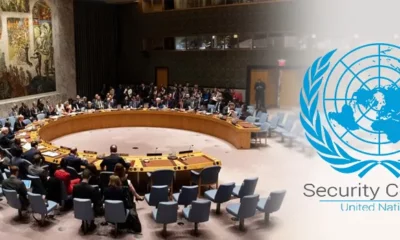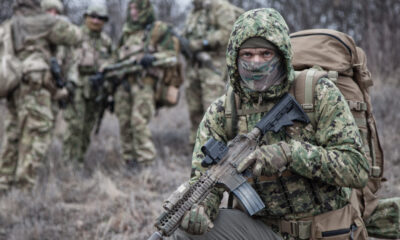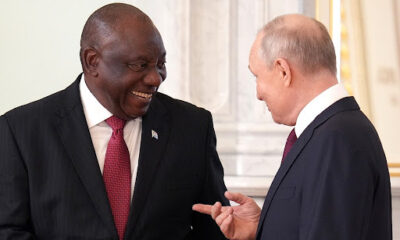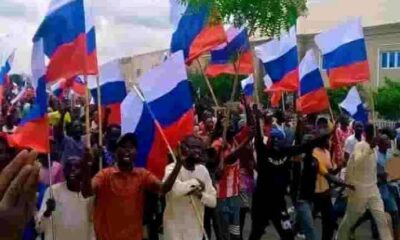Strictly Personal
Putin’s tribal war by Dare Babarinsa
Published
3 years agoon
The Ukrainian conflict may prove to be the most consequential war of the 21st Century. It may also signal the end of the Vladimir Putin era in Russian politics and the reduction of the once-mighty Russia into a glorified Third World country armed with nuclear weapons. That may be the ultimate oxymoron, but it is not far-fetched.
On Monday, Russia and China denied America’s allegation that Russia is seeking military help from China. That this allegation could be made, at all, is a pointer to the terrible straight Russia had found itself under Putin. Without its oil export today, Russia cannot even compete with China not to talk of its old Western Allies with whom it fought Germany during the Second World War.
The Ukrainian War may also signal an end to the North Atlantic Treaty Organisation (NATO), in its old form as a military alliance. Faced with serious challenge from the catholic economic muscle of a resurgent China, the NATO alliance needs to reconsider itself as a military body.
Economics and diplomacy may dominate future conflicts without counting the army divisions of each side. The Western powers may be thinking that it is time to seize the initiatives from the Chinese factory workers who are dominating the world. They have even surpassed the Japanese as the ultimate economic rival to the Western World.
In 1987, I had joined a team of 15 distinguished visitors to Capitol Hill, the home of the American legislature, The Congress. On the corridor were many television monitors broadcasting live on C-Span network, the proceedings of The Senate. All the television sets that we saw were Japanese-made, mostly of the Sony brand.
A female Senator, who hosted our team in her office, complained that Americans were surrendering to the economic aggression of the Japanese.
Few years after our visit to the Capitol Hill, Japanese automaker, Toyota, surpassed General Motors as the number-one automobile manufacturer in the world.
Now both Japanese and the Americans are facing the competition of their lives from the Chinese. These were the Chinese that were so beholding to the Russians in the first half of the 20th Century.
During his 25 years in power, China’s Supreme Leader, Chairman Mao Zedong, travelled outside his country twice. On both occasions, he journeyed to Moscow to meet with Russian leaders.
During the Chinese Civil War that lasted for almost 30 years, the Chinese were the clients of the Russians, beholding to them in every way. Mao knew the Chinese Revolution would have been a non-starter without the help of the Russians and their leader, Comrade Josef Stalin, the famed Man of Steel.
Today, there are not enough steel in Russia to arm its troops and change the map of Europe. Putin’s gamble in invading Ukraine is nothing but a reckless attempt to force the world to reckon with him. Russia still has the second largest nuclear arsenal in the world. Its military is still ranked as second only to America’s.
By igniting another tribal war in Europe, Putin is making a bad situation worse. His victory, if it ever comes, would be very costly and unsustainable in the long run. Instead of having Ukraine as a buffer zone between his country and the West, he is turning almost all former satellite states of the old Soviet Union into anti-Russian countries.
Putin has rightly gambled that the West would not want to confront Russia militarily on the ground or in the sky. Despite the repeated request of Ukraine and its leader, President Volodymyr Zelenskyy, that America and its NATO allies should declare Ukraine a no-flying zone, America declined to do so. Ukrainians know that if America declares Ukraine a no-flying zone, Russia does not have the capacity to confront America in the sky. The Russian air force is second-rate compare to the air-muscle of the United States and its allies. Though it might be tactically effective to create a no-flying zone over Ukraine, it would be strategically suicidal.
Russia is not just another country with a second-rate air force. It is a nuclear power, the greatest in the world after America. It has enough nukes to destroy the world 10 times over. Russia is also a dictatorship where one man rules. If Putin is humiliated in the sky, he might be tempted to use chemical weapons or even reach for the nuclear button. A thermonuclear war with Russia may not last more than one week, but all the major cities of the world; New York, Moscow, London, St Petersburg, Paris, Washington DC, Rome, would be destroyed. Humanity may be reduced to ground-zero and civilisation returned to where it was 5,000 years ago.
It is evident that the Ukrainians are the losers in this conflict. The young Ukrainian president, who came to power on the wings of anti-Russian rhetoric, refused or was unable to acknowledge the strategic importance of Ukraine to Russia. In recent past, Ukraine had joined NATO forces in staging an elaborate joint military exercise on Ukrainian soil.
Zelenskyy had also upped his rhetoric against Russia by saying he was ready to defend his country’s territorial integrity by all means. He thought his NATO allies would go to war to defend him. He was wrong.
Putin has done enough to provoke Ukrainian hostility. First he seized Crimea, the rich resort of Ukraine. He is also promoting separatist agenda within Ukraine in provinces that have substantial number of native Russians. In truth, Putin was acting as an arch-tribalist, promoting only the interests of his kinsmen. Yet despite these provocations, a more mature leadership would have handled Russia differentially.
There are many things for Ukraine to protect. Its citizens live better than the Russians; they are richer, healthier and have greater access to the good things of life. Ukraine has the best health system in the old Eastern Europe, certainly better than Russia’s. This week, the United Nations Secretary General described Ukraine as the food basket of the world. If the truth must be told, the Russians envy their wealthier cousin, the Ukrainians.
With a more experienced leadership, Ukraine would have avoided this new tribal war. They could have done less with Russian baiting despite the heavy breathing of the Russian bear and the reckless ambition of Putin. By their ceaseless dalliance with the West, they provoked the anger and belligerence of the insecure Putin. It is no consolation that this war is most likely to end badly for Putin and his corrupt and inefficient oligarchy.
There is a lot to learn from the Ukrainian experience. One, war does not give sufficient notice. Two, no one, no matter how much he loves you, will fight your war for you. Three, it is always better to be prepared for war if you want peace.
Nigeria is not at war, but we have seen how unprepared we are even to maintain a semblance of peace. Few weeks ago, some well-fed billionaires imported bad fuel for us and for weeks, queues have resurfaced at fuel stations. No one has been sanctioned or considered culpable. Let the people bear the brunt. There is no strategic reserve for our oil in case of crisis, war or natural disaster. Mere wrong importation by some fat blokes had disrupted the national balance.
Even our trains cannot run its schedule course without running out of fuel and passengers get stranded in the middle of nowhere. Of course, it is normal and no one it to be blamed. How then can we be surprised that a suspected killer had the presence of mind to become the queen of Kirikiri Prison? One wisecrack declared: “If you are living in Nigeria and your BP is normal, then you are not normal!”
You may like
-


Russia vetoes Sudan conflict Security Council move
-


Military advisors from Russia arrive Equatorial Guinea
-


Russia claims African, ex-Soviet nations want its mpox vaccine
-


South Africa: Russia remains a valued ally, Ramaphosa tells Putin
-


Russia’s Wagner claims to have recovered bodies of its mercenaries from July deadly attack
-


Russia, Ukraine exchange words over hunger protest in Nigeria, blame US, UK
Strictly Personal
Budgets, budgeting and budget financing, By Sheriffdeen A. Tella, Ph.D.
Published
2 days agoon
November 20, 2024
The budget season is here again. It is an institutional and desirable annual ritual. Revenue collection and spending at the federal, State and local government levels must be authorised and guided by law. That is what budget is all about. A document containing the estimates of projected revenues from identified sources and the proposed expenditure for different sectors in the appropriate level of government. The last two weeks have seen the delivery of budget drafts to various Houses of Assembly and the promise that the federal government would present its draft budget to the National Assembly.
Do people still look forward to the budget presentation and the contents therein? I am not sure. Citizens have realised that these days, governments often spend money without reference to the approved budget. A governor can just wake up and direct that a police station be built in a location. With no allocation in the budget, the station will be completed in three months. The President can direct from his bathroom that 72 trailers of maize be distributed to the 36 states as palliatives. No budget provision, and no discussion by relevant committee or group.
We still operate with the military mentality. We operated too long under the military and of the five Presidents we have in this democracy, two of them were retired military Heads of State. Between them, they spent 16 years of 25 years of democratic governance. Hopefully, we are done with them physically but not mentally. Most present governors grew up largely under military regimes with the command system. That is why some see themselves as emperor and act accordingly. Their direct staff and commissioners are “Yes” men and women. There is need for disorientation.
The importance of budget in the art of governance cannot be overemphasized. It is one of the major functions of the legislature because without the consideration and authorisation of spending of funds by this arm of government, the executive has no power to start spending money. There is what we refer to as a budget cycle or stages. The budget drafting stage within the purview of the executive arm is the first stage and, followed by the authorisation stage where the legislature discusses, evaluates and tinkers with the draft for approval before presenting it to the President for his signature.
Thereafter, the budget enters the execution phase or cycle where programmes and projects are executed by the executive arm with the legislature carrying out oversight functions. Finally, we enter the auditing phase when the federal and State Auditors verify and report on the execution of the budgets. The report would normally be submitted to the Legislature. Many Auditor Generals have fallen victim at this stage for daring to query the executives on some aspects of the execution in their reports.
A new budget should contain the objectives and achievements of the preceding budget in the introduction as the foundation for the budget. More appropriately, a current budget derives its strength from a medium-term framework which also derives its strength from a national Development Plan or a State Plan. An approved National Plan does not exist currently, although the Plan launched by the Muhammadu Buhari administration is in the cooler. President Tinubu, who is acclaimed to be the architect of the Lagos State long-term Plan seems curiously, disillusioned with a national Plan.
Some States like Oyo and Kaduna, have long-term Plans that serve as the source of their annual budgets. Economists and policymakers see development plans as instruments of salvation for developing countries. Mike Obadan, the former Director General of the moribund Nigeria Centre for Economic and Management Administration, opined that a Plan in a developing country serves as an instrument to eradicate poverty, achieve high rates of economic growth and promote economic and social development.
The Nigerian development plans were on course until the adoption of the World Bank/IMF-inspired Structural Adjustment Programme in 1986 when the country and others that adopted the programme were forced to abandon such plan for short-term stabilisation policies in the name of a rolling plan. We have been rolling in the mud since that time. One is not surprised that the Tinubu administration is not looking at the Buhari Development Plan since the government is World Bank/IMF compliant. It was in the news last week that our President is an American asset and by extension, Nigeria’s policies must be defined by America which controls the Bretton Woods institutions.
A national Plan allows the citizens to monitor quantitatively, the projects and programmes being executed or to be executed by the government through the budgeting procedure. It is part of the definitive measures of transparency and accountability which most Nigerian governments do not cherish. So, you cannot pin your government down to anything.
Budgets these days hardly contain budget performance in terms of revenue, expenditure and other achievements like several schools, hospitals, small-scale enterprises, etc, that the government got involved in successfully and partially. These are the foundation for a new budget like items brought forward in accounting documents. The new budget should state the new reforms or transformations that would be taking place. Reforms like shifting from dominance of recurrent expenditure to capital expenditure; moving from the provision of basic needs programmes to industrialisation, and from reliance on foreign loans to dependence on domestic fund mobilisation for executing the budget.
That brings us to the issue of budget deficit and borrowing. When an economy is in recession, expansionary fiscal policy is recommended. That is, the government will need to spend more than it receives to pump prime the economy. If this is taken, Nigeria has always had a deficit budget, implying that we are always in economic recession. The fact is that even when we had a surplus in our balance of payment that made it possible to pay off our debts, we still had a deficit budget. We are so used to borrowing at the national level that stopping it will look like the collapse of the Nigerian state. The States have also followed the trend. Ordinarily, since States are largely dependent on the federal government for funds, they should promote balanced budget.
The States are like a schoolboy who depends on his parents for school fees and feeding allowance but goes about borrowing from classmates. Definitely, it is the parents that will surely pay the debt. The debt forgiveness mentality plays a major role in the process. Having enjoyed debt forgiveness in the past, the federal government is always in the credit market and does not caution the State governments in participating in the market. Our Presidents don’t feel ashamed when they are begging for debt forgiveness in international forum where issues on global development are being discussed. Not less than twice I have watched the countenance of some Presidents, even from Africa, while they looked at our president with disdain when issues of debt forgiveness for African countries was raised.
In most cases, the government, both at the federal and state cannot show the product of loans, except those lent by institutions like the World Bank or African Development Bank for specific projects which are monitored by the lending institutions. In other cases, the loans are stolen and transferred abroad while we are paying the loans. In some other cases, the loans are diverted to projects other than what the proposal stated. There was a case of loans obtained based on establishing an international car park in the border of the State but diverted to finance the election of a politician in the State. The politician eventually lost the election but the citizens of the State have to be taxed to pay the loan. Somebody as “Nigeria we hail thee”.
Transformation in budgeting should commence subsequently at the State and federal level. Now that local government will enjoy some financial autonomy and therefore budgeting process, they should be legally barred from contracting foreign loans. They have no business participating in the market. They should promote balanced budget where proposed expenditures must equal the expected revenues from federal and internal sources. The State government that cannot mobilise, from records, up to 40 percent of its total budget from IGR should not be supported to contract foreign loans. The States should engage in a balanced budget. The federal government budget should shift away from huge allocations to recurrent expenditure towards capital expenditure for capital formation and within the context of a welfarist state.
Sheriffdeen A. Tella, Ph.D.
Strictly Personal
African Union must ensure Sudan civilians are protected, By Joyce Banda
Published
4 weeks agoon
October 25, 2024
The war in Sudan presents the world – and Africa – with a test. This far, we have scored miserably. The international community has failed the people of Sudan. Collectively, we have chosen to systematically ignore and sacrifice the Sudanese people’s suffering in preference of our interests.
For 18 months, the Rapid Support Forces (RSF) and the Sudanese Armed Forces (SAF) have fought a pitiless conflict that has killed thousands, displaced millions, and triggered the world’s largest hunger crisis.
Crimes against humanity and war crimes have been committed by both parties to the conflict. Sexual and gender-based violence are at epidemic levels. The RSF has perpetrated a wave of ethnically motivated violence in Darfur. Starvation has been used as a weapon of war: The SAF has carried out airstrikes that deliberately target civilians and civilian infrastructure.
The plight of children is of deep concern to me. They have been killed, maimed, and forced to serve as soldiers. More than 14 million have been displaced, the world’s largest displacement of children. Millions more haven’t gone to school since the fighting broke out. Girls are at the highest risk of child marriage and gender-based violence. We are looking at a child protection crisis of frightful proportions.
In many of my international engagements, the women of Sudan have raised their concerns about the world’s non-commitment to bring about peace in Sudan.
I write with a simple message. We cannot delay any longer. The suffering cannot be allowed to continue or to become a secondary concern to the frustrating search for a political solution between the belligerents. The international community must come together and adopt urgent measures to protect Sudanese civilians.
Last month, the UN’s Independent International Fact-Finding Mission for Sudan released a report that described a horrific range of crimes committed by the RSF and SAF. The report makes for chilling reading. The UN investigators concluded that the gravity of its findings required a concerted plan to safeguard the lives of Sudanese people in the line of fire.
“Given the failure of the warring parties to spare civilians, an independent and impartial force with a mandate to safeguard civilians must be deployed without delay,” said Mohamed Chande Othman, chair of the Fact-Finding Mission and former Chief Justice of Tanzania.
We must respond to this call with urgency.
A special responsibility resides with the African Union, in particular the AU Commission, which received a request on June 21 from the AU Peace and Security Council (PSC) “to investigate and make recommendations to the PSC on practical measures to be undertaken for the protection of civilians.”
So far, we have heard nothing.
The time is now for the AU to act boldly and swiftly, even in the absence of a ceasefire, to advance robust civilian protection measures.
A physical protective presence, even one with a limited mandate, must be proposed, in line with the recommendation of the UN Fact-Finding Mission. The AU should press the parties to the conflict, particularly the Sudanese government, to invite the protective mission to enter Sudan to do its work free from interference.
The AU can recommend that the protection mission adopt targeted strategies operations, demarcated safe zones, and humanitarian corridors – to protect civilians and ensure safe, unhindered, and adequate access to humanitarian aid.
The protection mission mandate can include data gathering, monitoring, and early warning systems. It can play a role in ending the telecom blackout that has been a troubling feature of the war. The mission can support community-led efforts for self-protection, working closely with Sudan’s inspiring mutual-aid network of Emergency Response Rooms. It can engage and support localised peace efforts, contributing to community-level ceasefire and peacebuilding work.
I do not pretend that establishing a protection mission in Sudan will be easy. But the scale of Sudan’s crisis, the intransigence of the warring parties, and the clear and consistent demands from Sudanese civilians and civil society demand that we take action.
Many will be dismissive. It is true that numerous bureaucratic, institutional, and political obstacles stand in our way. But we must not be deterred.
Will we stand by as Sudan suffers mass atrocities, disease, famine, rape, mass displacement, and societal disintegration? Will we watch as the crisis in Africa’s third largest country spills outside of its borders and sets back the entire region?
Africa and the world have been given a test. I pray that we pass it.
Dr Joyce Banda is a former president of the Republic of Malawi.
EDITOR’S PICK


IMF mission concludes 4th loan program assessment in Egypt
Following the completion of a recent visit to Egypt, the International Monetary Fund (IMF) has announced that its mission had...


Mali’s junta names spokesman Abdoulaye Maiga new Prime Minister
A day after dismissing Choguel Maiga for criticising the government, Mali’s governing junta named its spokesperson, Abdoulaye Maiga, as Prime...


Brazilian meatpacker JBS invests $2.5 billion in Nigeria, builds six facilities
Brazilian meatpacker JBS says it has inked a memorandum of understanding with the Nigerian government for a $2.5 billion investment...


China’s Xi meets with Morocco’s Crown Prince
Morocco’s official media reports that Chinese President, Xi Jinping, visited Morocco briefly on Thursday. According to Morocco’s MAP, Crown Prince...


65% of Nigerian households lack money for healthy food—Survey
A survey conducted by the National Bureau of Statistics (NBS) has revealed that around 65% of Nigerian households, which is...


Ghana partners with The Gambia to provide free roaming services
Ghana and The Gambia are in the process of launching free roaming services that will enhance a West African connectivity....


Zambia: APP leader lampoons PF over pledge to reverse forfeited properties
Leader of one of Zambia’s opposition parties, Advocates for People’s Prosperity (APP), Mwenye Musenge, has criticised the Patriotic Front (PF)...


Ghanaian winger Fatawu out for season with ACL injury
Ghana and Leicester City winger, Abdul Fatawu, has been ruled out of the rest of the EPL season after suffering...


DRC authorities arrest six over break-in at Lumumba’s Mausoleum
Police in the Democratic Republic of Congo (DRC) say six people have been arrested over a break-in and vandalism at...


Finnish court imprisons Nigeria’s Simon Ekpa for aiding terrorism
Simon Ekpa, a Nigerian separatist leader based abroad, has been placed under detention by the Päijät Häme District Court...
Trending
-

 Sports2 days ago
Sports2 days agoSA football legend Lucas ‘Masterpieces’ Moripe passes away
-

 Metro2 days ago
Metro2 days agoWanted Zambian MP who escaped from prison custody captured in Harare
-

 Metro1 day ago
Metro1 day agoNigerian Senate confirms influx of terrorists from Mali, Burkina Faso into the country
-

 Culture2 days ago
Culture2 days agoMiss SA opens up on why she withdrew from Miss Universe pageant


